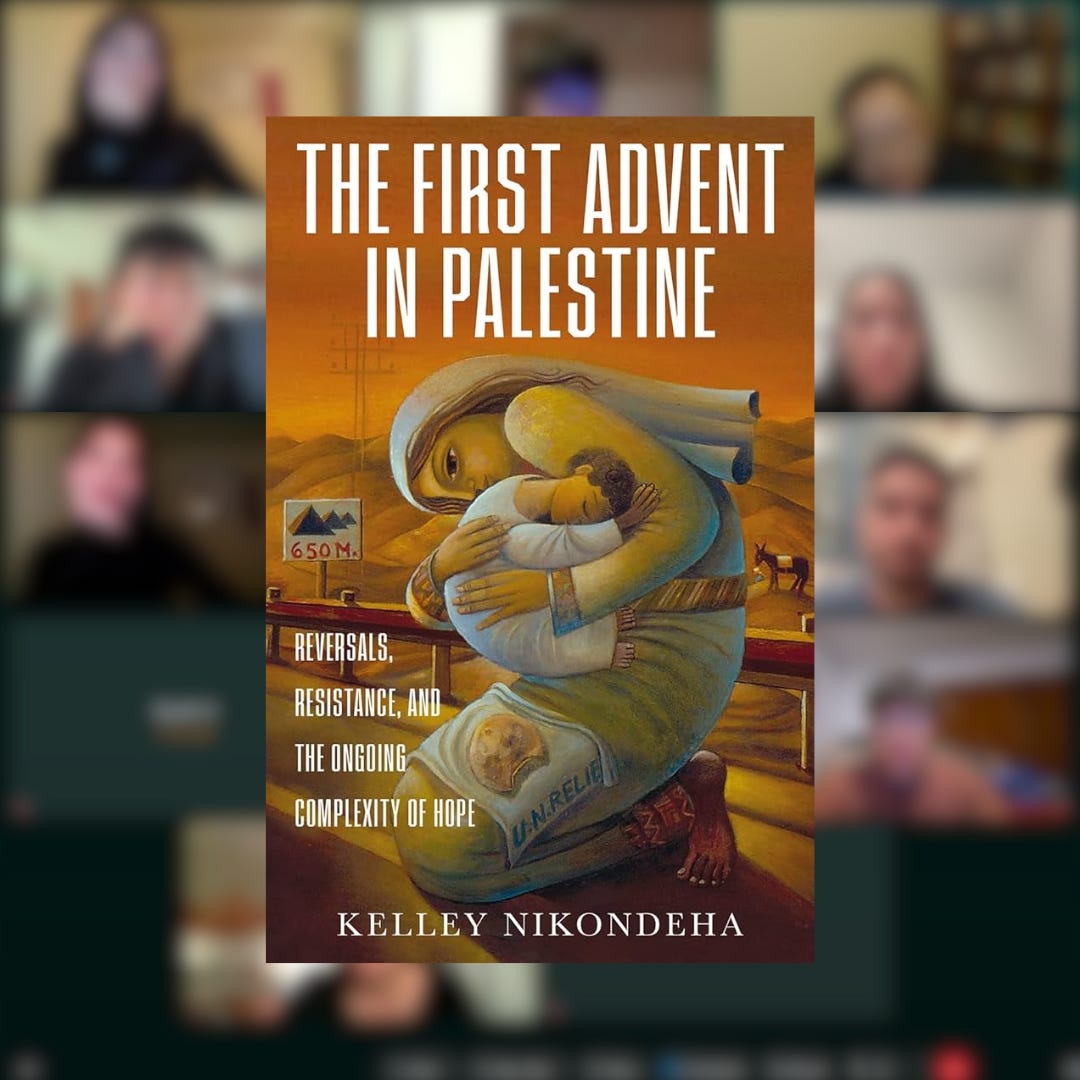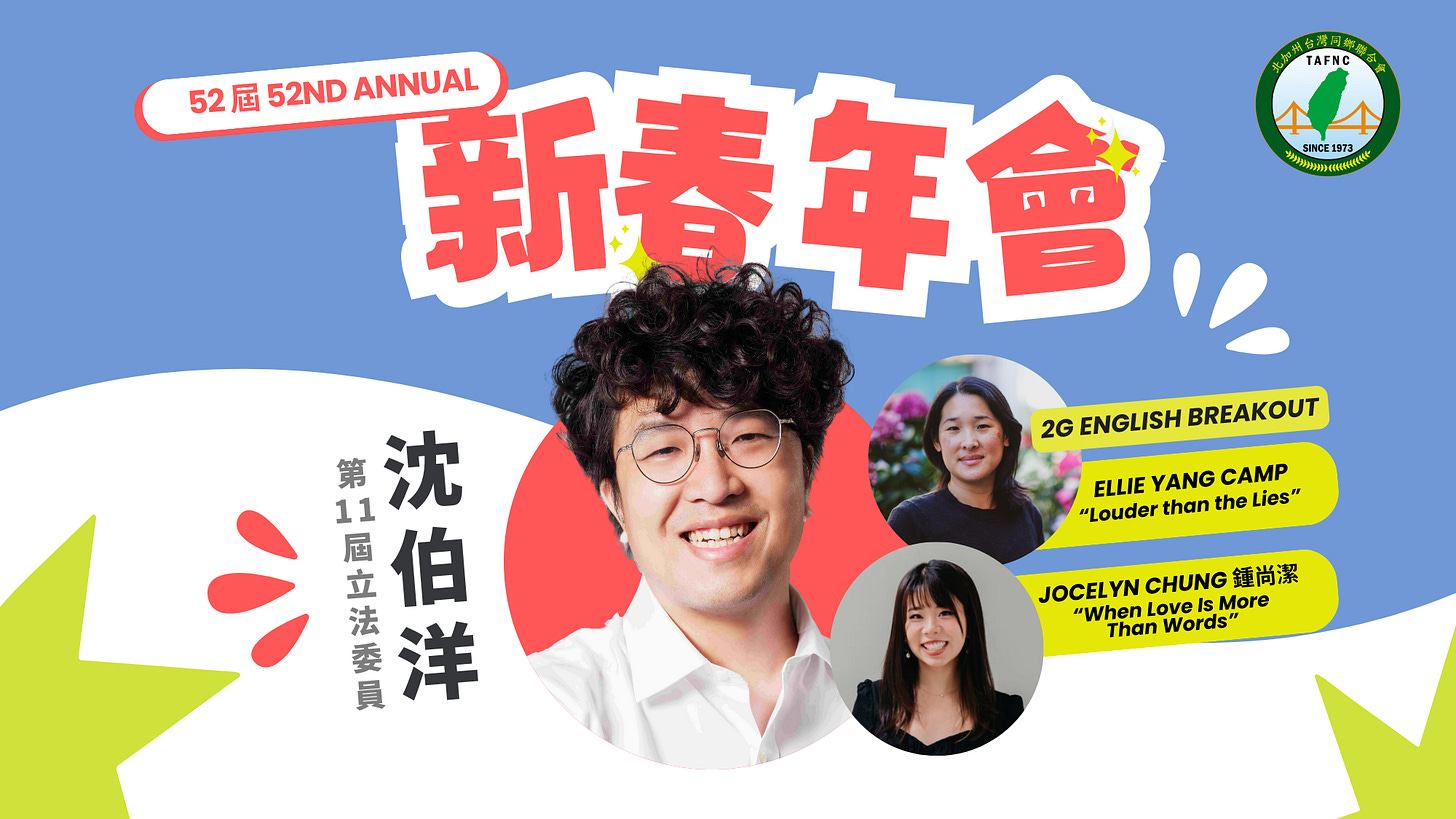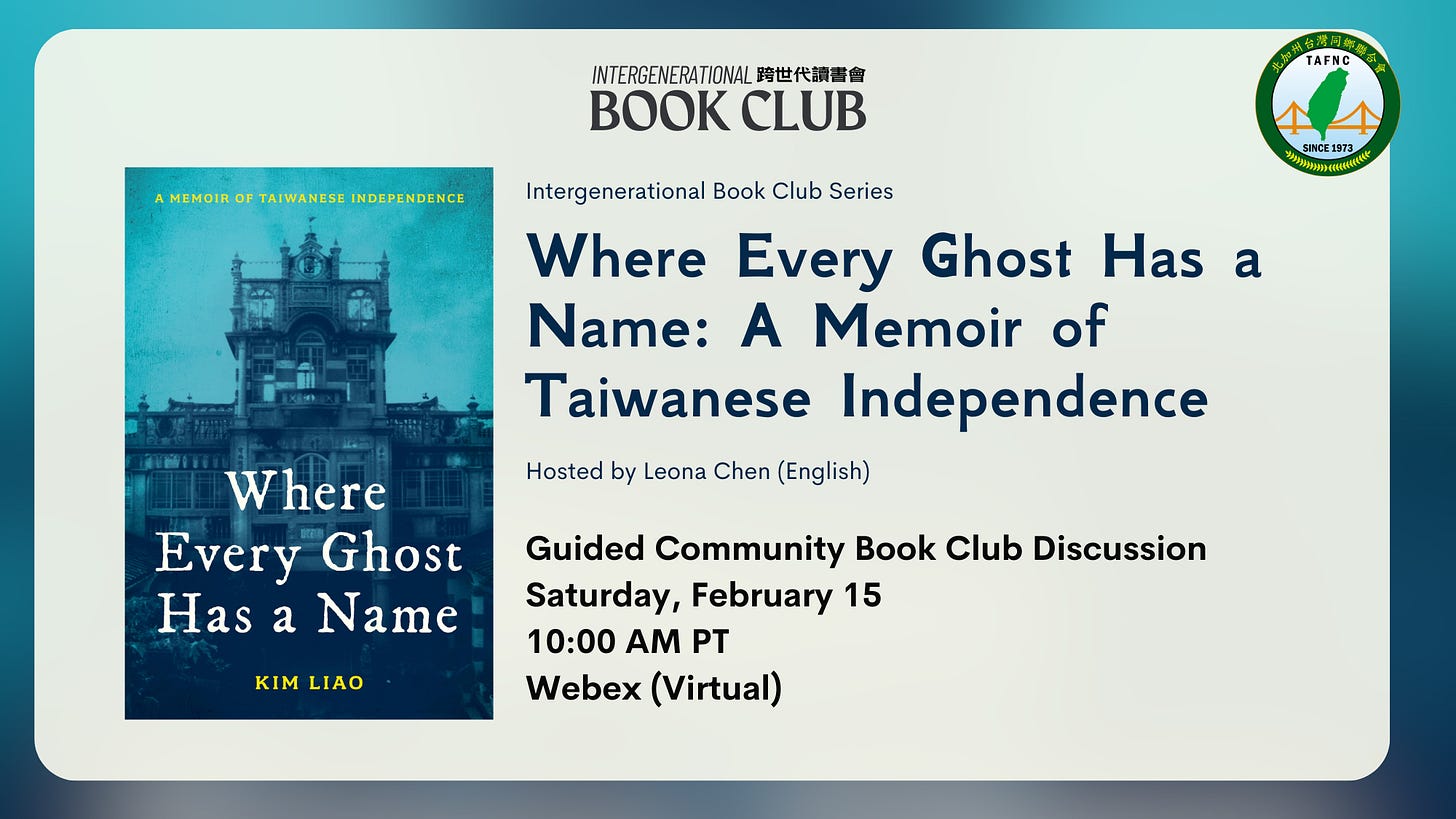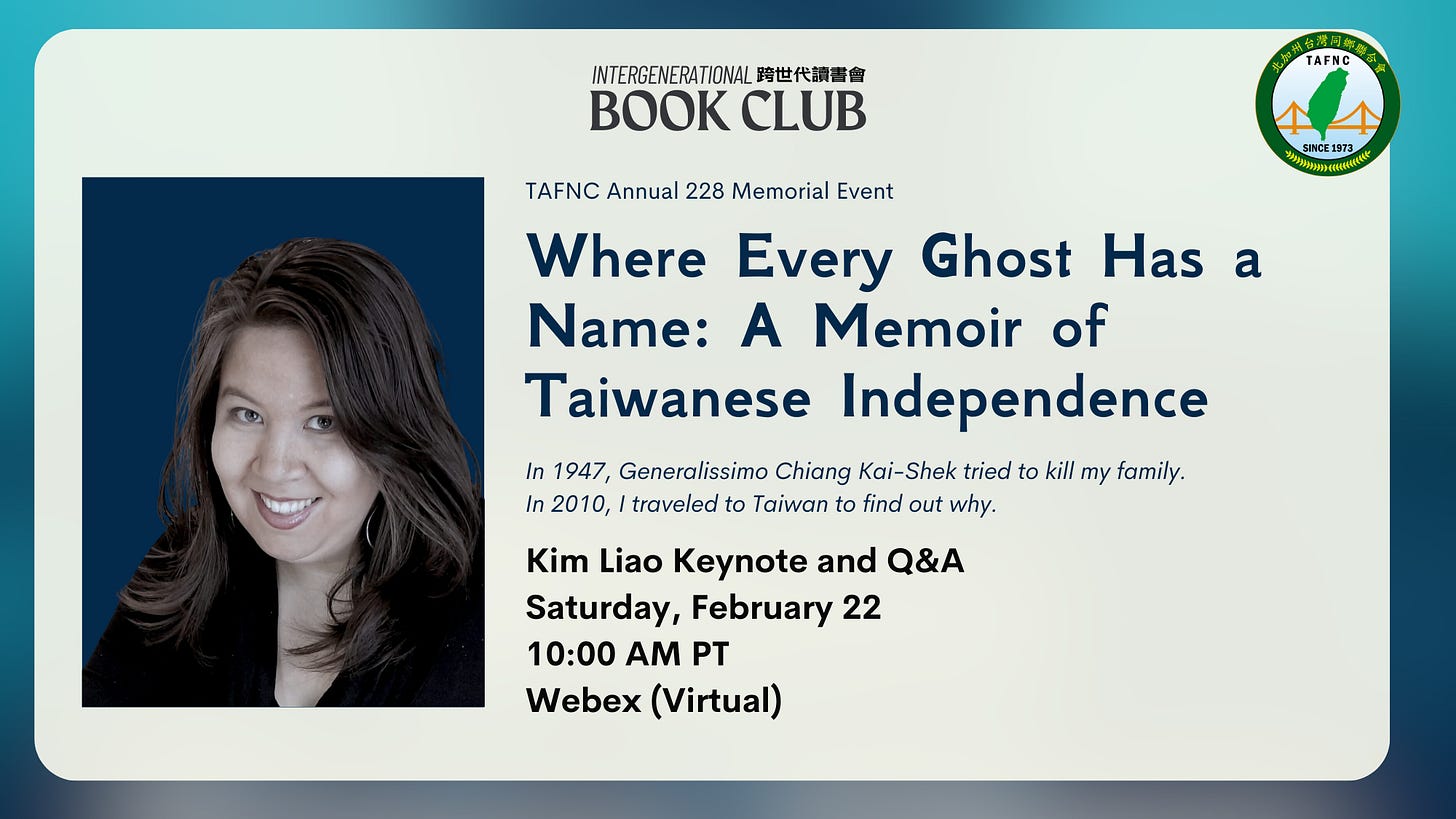Vol 06: The meek shall inherit the Earth
Reflections on a Taiwanese American community reading of "The First Advent in Palestine." Plus, upcoming virtual and in-person events!
"I kind of want to be in a book club, but I only want to read the books I want to read. Basically I want a small group of friends who will read whatever I tell them to. Basically I want a cult." | @rebeccarightnow (X)
Hello from the command center of my bookish cult! For the final newsletter of the year, I wanted to express my gratitude once more for all the kind, generous, and patient people who've taught and learned alongside me, most recently for a Taiwanese American book club discussion on The First Advent in Palestine.
I am especially grateful for my pastor, Reverend William Chou, for lending his time, empathy, and boundless expertise to both discussions; and to Andy, whose inspired investigation of meekness coalesced our two sessions in beautiful, illuminating ways.
Kelley Nikondeha’s The First Advent in Palestine: Reversals, Resistance, and the Ongoing Complexity of Hope attempts to restore a geographic, socioeconomic, and political Palestinian context to the distilled, Disney-fied Advent story. This restoration forces us to confront the gender violence, dispossession, and poverty of Nazareth, Bethlehem, and the many villages in between, positioning the Incarnation as God’s experience of empire in solidarity with His weakest and most vulnerable. A passage I kept coming back to, that I feel best captures the book’s essence:
“This is Incarnation. Not inhabiting a body of privilege exempt from poverty and violence, but living in a body thick with the trauma common to most in Galilee and Judea. God Incarnated this pain in his own human body. It became a part of his human experience and is now woven into God’s eternal memory. Jesus had a lifelong relationship with Roman soldiers and those who colluded with the empire that killed so many of his neighbors and relatives and perhaps even his own father. Consider the deeper power, then, of Jesus’s words of love, forgiveness, and mercy in light of his own trauma. To love those who wrought suffering on his family and himself is divine love. His human grief pierced straight into the heart of God, and God’s love came in response.”
A few fieldnotes from our book club:
In our first discussion, nearly half of the participants were trained as clerics with experience ministering in Palestine and/or to Palestinians. We talked about the allures and perils of collapsing narratives for the sake of “congruence” or finding “common ground.” (Later, Paster Chou reminded us that the Advent pageant itself flattens four Gospels, stripping the narratives of their due context and positionality.) We also discussed Mary’s Magnificat, a radical manifesto alternately banned throughout history and neutered by evangelicals for daring to, from a woman’s perspective especially, articulate an end to exploitative and unjust economies. Each of us shared an experience of Advent in church - whether from the pulpit or the pews - and lamented all the texture that has been lost in its material performance, but the hope that persists and guides us through the season.
In our second discussion, Serena offered a brilliant comparison between the Christian imperative for meekness and Taiwan’s heartbreaking diplomatic strategy. We talked about the indignity of trying to earn one’s humanity through righteousness, only for our efforts to be rendered futile by someone (or some entity) wholly invested in denying it; we talked about how angry this made us feel, how it compounds our suffering. We drew comparisons between Christ’s Sermon on the Mount, which calls for peace and forgiveness in the face of aggression and provocation, and Taiwan’s unrelenting campaign for inclusion in the United Nations and World Health Organization by proving again, and again, how “Taiwan can help, Taiwan is helping.” We are the do-gooders snubbed over and over again; and while it is infuriating, it is also, Andy suggests, how we ultimately survive.
We thought about the Nassars from Chapter 6, a Palestinian family living just south of Bethlehem. Through generations and under various regimes - Ottoman, British, Jordanian, and now Israeli - their ancestral claim to the land has been litigated and violated many times over. “For most,” Nikondeha writes, “this would be fuel for the fire of hatred against these neighbors, causing resistance and violence in the spirit of righteous anger. But guided by the words and witness of Jesus, the Nassar family refuses to be enemies. Instead, when people come to harass them, they offer them tea and a shady place to sit… They are an outpost of peace and welcome. The welcome is also a strategy to remain visible in a political climate that seeks to erase and evict them.”
Isn’t this, Serena offered, echoed in Vanessa Hope’s searing documentary, Invisible Nation? And how Taiwan’s fight for survival, too, looks less like violence or vengeance (though military preparations inevitably loom in the background), and more about the slow, patient work of earning our way out of our invisibility? In the asymmetrical standoff between a bully and a helper, we share a difficult Christian calling: to endure and work towards “a paradigm for peace whose foundation is justice, not violence… [to seek] another way to order the world, where God arrives and Jesus incarnates peace in his life lived among those like him— the poor, the marginalized, the meek.”
We thought, too, about the shepherds of Advent, those operating at the outskirts of empire, considered “enemies of the state… unseen and underappreciated, yet absolutely essential to the economy… most susceptible to deep exploitation by the systems they serve, which don’t protect them in turn.” We thought about the implication of them being made central to the Advent story and central to God’s vision of peace. We reflected on the shepherds in our lives - the disenfranchised and dismissed, rejected for proximity to the “undesirable” or “unclean.” What does it mean for the shepherds to be chosen as the first witnesses to Christ’s arrival? What does it mean for the most lowly to become the messengers?
Our reading of the text, informed by a longing to be peacebuilders for Taiwan, Palestine, and the broader world, led us to confront that the peace we seek will remain incomplete in our lifetime, and in that of generations beyond us, even as it is carried forward. This, Nikondeha writes, was the human experience of Jesus. But there is a way to shoulder the work, and to follow the Advent tradition of centering the shepherds and the meek: the Indigenous people of Palestine and Taiwan, migrant workers “unseen and underappreciated,” the most vulnerable of each and every community.
This is something I need to noodle on more, but I think often of the “meek” erased in Taiwan’s tech diplomacy, the economic injustices compounded in the name of our efforts to become visible, worthy of attention and protection. What kind of peace, what kind of justice will we realize when we make kings of people like Jensen Huang and Morris Chang without tending to the migrant workers who have made the semiconductor economic empire possible? This is not a flat critique of the efficacy of tech diplomacy, which is certainly more attractive than military dominance, nor of Huang or Chang. And perhaps the Christian vision of peace is out of scope for cross-strait peace-building initiatives! And our goals should be articulated through sanctions and not scriptures!
To be clear, I wholeheartedly support an explicit, codified separation of church and state. But I do believe my faith and Taiwanese heritage are braided in my personal convictions about Taiwanese sovereignty, transitional justice, and liberation for the least of us. I also believe, fervently, that I am not alone in these convictions, and this book club discussion is just one example of all the ways my life is filled with hope.
I am grateful for the lucid, tender discourse in my life illuminating possibilities of solidarity between Palestinians and the Taiwanese without collapsing our stark differences, particularly in our lived realities today. For all we share, the most useful are our instinct for nuance, our desire for healing, and our understanding that the two are inextricably related. I will conclude by citing Nikondeha’s closing sentences:
“The peacemakers formed by advent are those who resist empire, who practice hospitality with neighbors, and who enter into solidarity with God in the work of liberation for everyone. May there be calm, bright nights ahead for the peacemakers, the meek, and all people God accompanies through advent still.”
AHHH I meant to shorten these newsletters but have again failed to do so. Apologies to my long-suffering translator and mother. Here are some bulletin announcements!
Upcoming Events:
January 25, 2025: TAFNC Annual Lunar New Year Luncheon & Keynote (ft. Puma Shen 沈伯洋)
Ticketed Event - Link to reserve tickets
Join us at the Taiwanese American Federation of Northern California's 52nd Annual Lunar New Year Luncheon & Keynote!
Main Stage Keynote: Legislator Puma Shen 沈伯洋 第11屆立法委員
Shen is a Taiwanese scholar, lawyer, and educator, affiliated with the Democratic Progressive Party (DPP) as a political figure. His areas of focus include human rights, criminal policy, youth issues, and information warfare. His remarks will be delivered in Taiwanese (Taigi) and Mandarin.
English Breakout Program: Authors Ellie Yang Camp and Jocelyn Chung 鍾尚潔
Camp is an artist and Asian American community educator from the San Francisco Bay Area. The proud daughter of Taiwanese immigrants, she has been a high-school history teacher, a full-time parent, a calligrapher, an anti-racist educator, and now an author. Her first book, Louder Than the Lies: Asian American Identity, Solidarity, and Self-Love, which unpacks the racial experiences of Asian Americans under white supremacy.
Chung is a Taiwanese American designer & author who loves exploring the intersection of thoughtful storytelling and communicative design. Her debut picture book, When Love is More than Words, is a beautiful story about a family who shows their love in a multitude of ways.
Children's Program: Bilingual Storytime with the East Bay Taiwanese Association
Signed copies of Camp's and Chung's books will be available for purchase on site; please indicate interest when registering!
Other TAFNC events, including ones primarily hosted in Taiwanese and Mandarin, can be found here: https://tafnc.org/events/
February 15, 2025: Book Club Discussion - “Where Every Ghost Has a Name: A Memoir of Taiwanese Independence” - 10AM PT
Join the TAFNC for an intergenerational virtual book club discussion on Kim Liao’s memoir, “Where Every Ghost Has a Name: A Memoir of Taiwanese Independence.” The discussion will be primarily in English (Taiwanese or Mandarin comments welcome) and moderated by Leona Chen. Registration required for link to participate.
Community Discussion Guide | Discussion Webex Registration Link
February 22, 2025: Kim Liao Keynote and Q&A (TAFNC 228 Annual Memorial Event) - 10AM PT
“Tell a child nothing, and she will become obsessed with knowledge.” Join Taiwanese American Kim Liao for a virtual keynote address and Q&A, moderated by Taiwanese American community leaders and writers. The webinar includes a keynote by Kim Liao, moderator reflections and dialogue, audience Q&A, and a short brainstorming session for audience members to begin reflecting on their own stories and histories.






